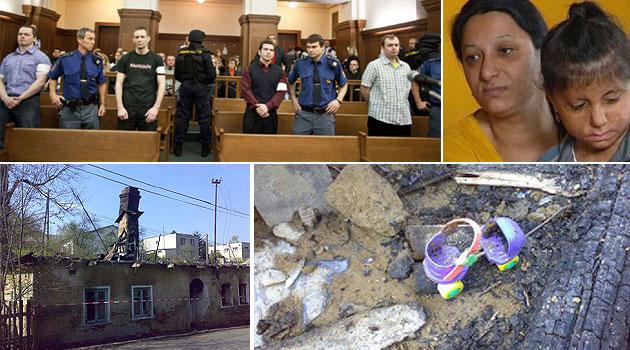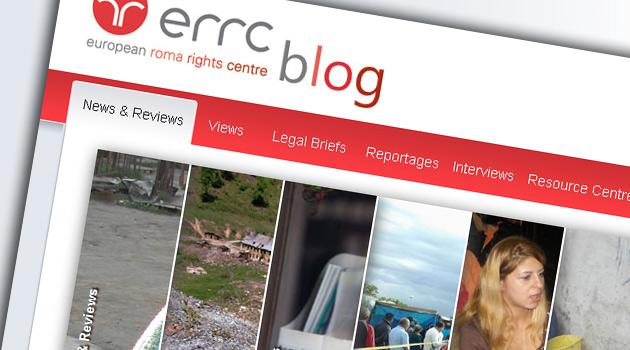Eight years since arson attack on Romani family in Czech town, perpetrators slow to pay compensation

Eight years ago, in the late night hours of 18 April and early morning hours of 19 April 2009, four neo-Nazis – Václav Cojocaru, Jaromír Lukeš, Ivo Müller and David Vaculík – threw Molotov cocktails into a single-family home in the town of Vítkov (Opava district) where a Romani family lived. During the subsequent blaze, three people were injured including a two-year-old girl, Natálka, who suffered burns over 80 % of her body.
A court handed down prison sentences of 20 and 22 years against the neo-Nazis. “Defendants Václav Cojocaru, Jaromír Lukeš, Ivo Müller and David Vaculík, all now in custody in a prison in Ostrava, were found guilty of committing these crimes as part of their affiliation with extremist groups and movements connected with racially-motivated manifestations in an attempt to make themselves more visible in those movements and to society by undertaking a bigger action ahead of the 120th anniversary of the birth of Adolf Hitler, which fell on 20 April 2009 and which the members of those groups customarily commemorate by holding the broadest possible variety of events,” the verdict reads.
The premeditated attack was undertaken on 18 April 2009 before midnight. Jaromír Lukeš, according to the verdict, had recalled that house number 58 on Opavská Street in Vítkov was occupied by a Romani family with small children.
The house was intentionally set on fire to cause the deaths of the occupants because of their ethnicity, including the persons in the home who were younger than 15. The verdict further states: “Near the scene of the attack the perpetrators prepared three Molotov cocktails as follows: Cojocaru, Lukeš and Müller poured pure gasoline into glass bottles from alcholic beverages that held at least 0.7 liters, filling them at least three-quarters full. They then inserted strips of fabric into the necks of the bottles to create flammable wicks. Cojocaru provided the bottles, fabric and gasoline. He, Müller and Vaculík, as agreed, got into an automobile being driven by Lukeš. Vaculík sat next to the driver, while Cojocaru and Müller sat in the back seat, and they drove to the house at Opavská 58. As they were driving, everybody except Lukeš covered their faces and put on gloves, and after arriving, Cojocaru, Müller and Vaculíka got out of the car with the Molotov cocktails and approached the house, the long side of which paralleled the local road. They lit the wicks with a lighter provided by Lukeš and then each went to stand by a different window, from left to right in this order: David Vaculík, Ivo Müller, Václav Cojocaru. They threw the Molotov cocktails with the burning wicks into the windows such that the bottles broke, the gasoline caught fire, and flammable materials inside the house caught fire, and then they drove away from the scene in the vehicle.”
Natálka’s grandmother saw the attackers at the time because she was standing right at the kitchen window when a black car drove up to the house and several people jumped out of it. They then began to throw the burning bottles, she testified just afer the attack.
“They were young guys and they shouted: ‘You Gypsies can all burn to death here!'” she said at the time. Lukáš Humpl, a spokesperson for the emergency responders, described the situation just after the attack as follows: “At ten minutes before midnight the doctor called us from the medical center for long-term patients in Vítkov, where a 27-year-old woman had come running in with a two-year-old girl. The child had serious second-degree and third-degree burns over more than 80 % of her body and had inhaled smoke.”
Practically every part of the girl’s body had been burned, so before the helicopter arrived to evacuate her, the doctor put her into artifical sleep. She received the necessary medicines and was connected to artificial respiration.
Politicians quickly condemn the attack
The arson attack was rapidly responded to by politicians. “I am seriously disturbed by the growth in extremism in the Czech Republic, the most dangerous manifesation of which is direct attacks on health and lives,” then-Czech Prime Minister Topolánek said on Sunday, 19 April 2009 in a statement, adding that the issue of extremism would be taken up by his cabinet.
The attack was even condemned by then-Czech President Václav Klaus. “I recently paid homage to the memory of Jan Zajíc in the town of Vítkov, and the meeting with the nice local people there was a great experience for me. That makes me all the more horrified by the crude, nasty crime that has happened there. What kind of people are capable of setting a little child on fire? This monstrous act must be investigated and harshly punished,” Klaus said in a statement.
Later on, however, Klaus said he did not like the length of the sentences handed down against the racist arsonists because in his view they were too harsh. Then-Czech Human Rights and Minorities Minister Michael Kocáb decided immediately after the attack, as an act of solidarity, to personally donate CZK 100 000 [EUR 3 720] to the victimized family.
Trial of the racists
11 May 2010 was the day the trial of the racists began. All four were charged with committing attempted murder and property damage as accomplices.
According to the indictment, the defendants had committed actions aiming to cause death. The motivation had been the victims’ ethnicity.
The attack was performed to honor the 120th anniversary of Adolf Hitler’s birth. The verdict was announced on 20 October 2019 and all of the defendants were found guilty of attempted murder and property damage.
Lukeš, Müller and Vaculík were sentenced to 22 years in prison, while Cojocaru, who had no prior record, was sentenced to 20 years, and all were ordered to pay compensation. They immediately appealed.
The appeals court subsequently reduced Müller’s sentence by two years because he collaborated with detectives and expressed regret. The racists were ordered to pay the victimized family compensation for their damages in the amount of CZK 9 million [EUR 335 000] altogether.
For the time being, however, the convicts have paid just the bare minimum. “The convicts have sent us about CZK 5 000 during the past two years. Just two of them have made payments, irregularly, each time in the hundreds of crowns,” the mother of the victimized family, Anna Siváková, told the media at the end of last year.
Reactions to the verdict
Then-Czech Prime Minster Petr Nečas called the verdict proportionate, emphasizing that he believed a long prison sentence for the arsonists in the case is in order. The PM perceived the young men’s actions as “serious and worthy of condemnation”.
Klaus, however, said he was “startled” by the length of the sentences, which seemed disproportionate to him. “The length of the punishment seems unanticipated – it’s unexpectedly long,” he told news server Novinky.cz, adding, “I am reflecting on whether this length of sentence, which I would compare with some cases of requests for clemency, actually will be the most correct way to prevent such phenomena from repeating in future.”
